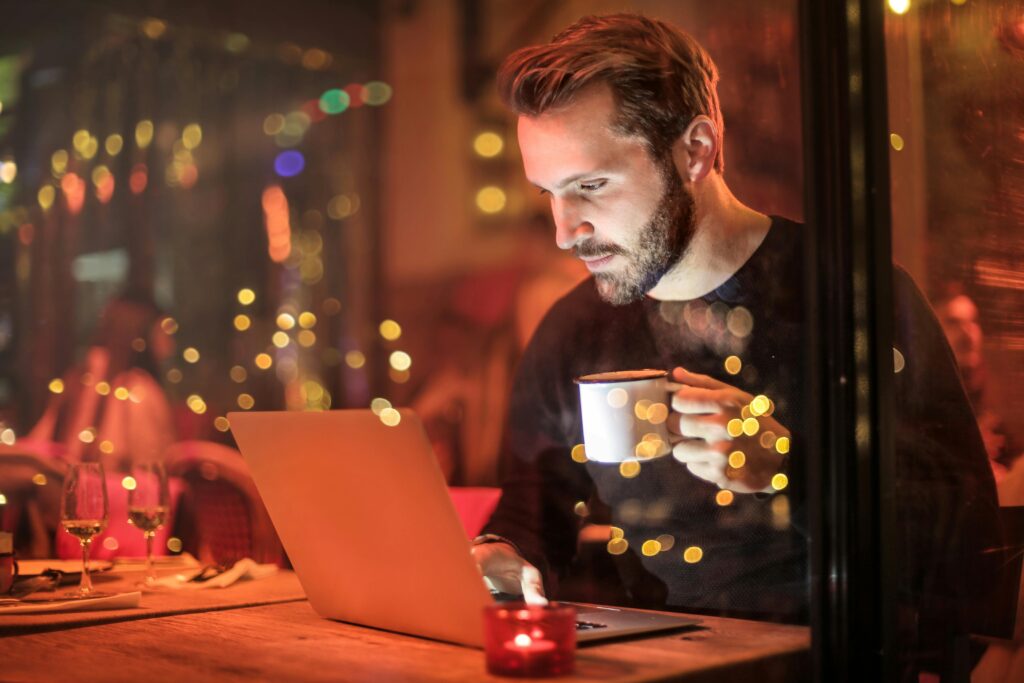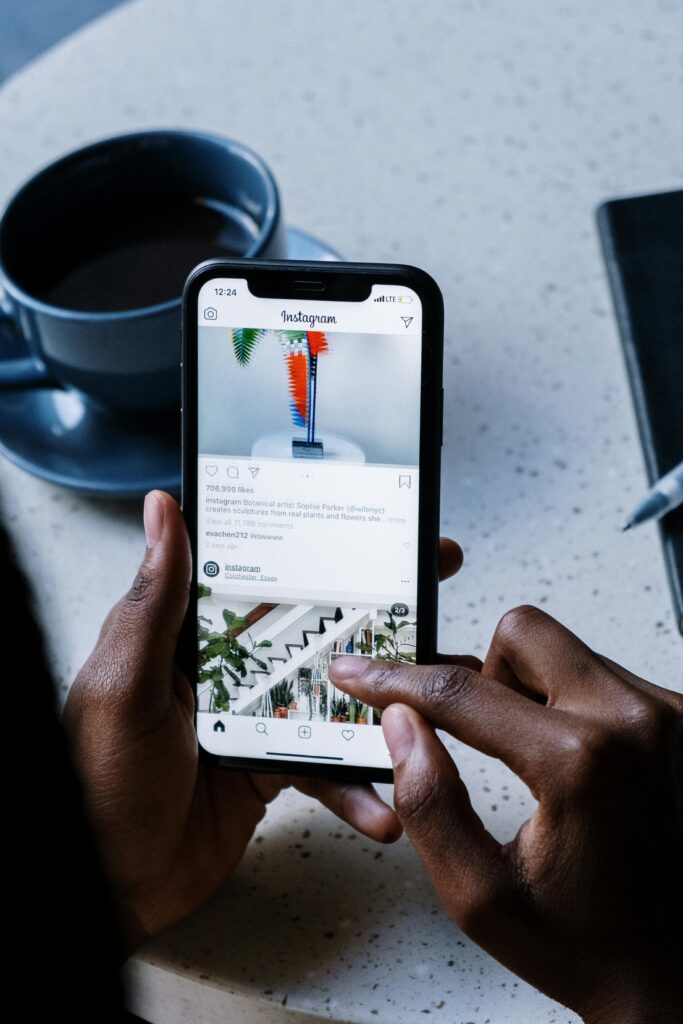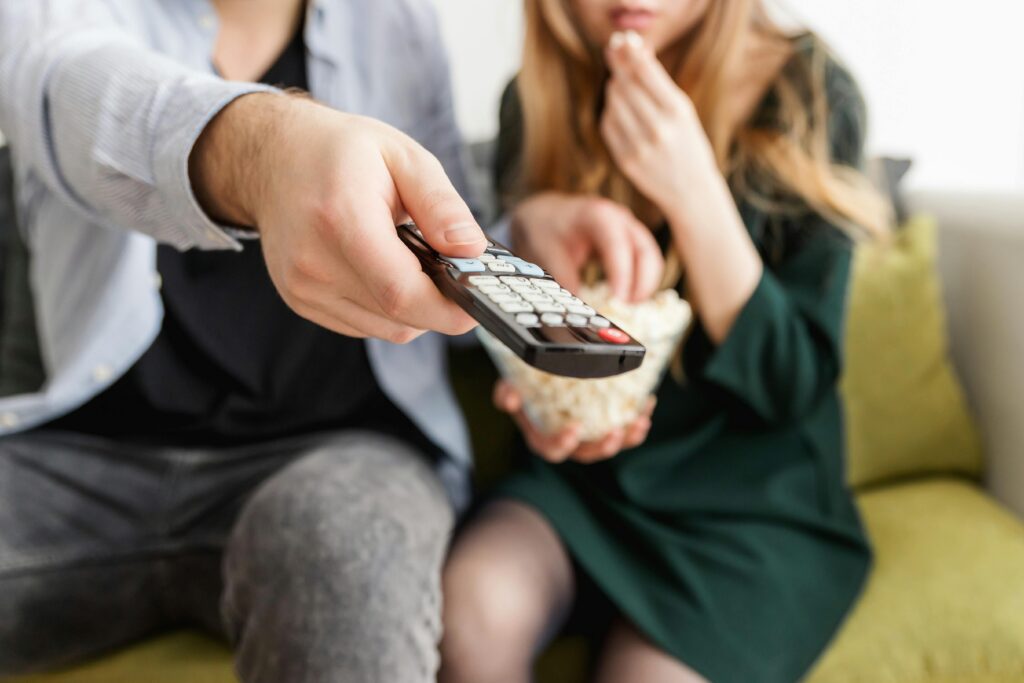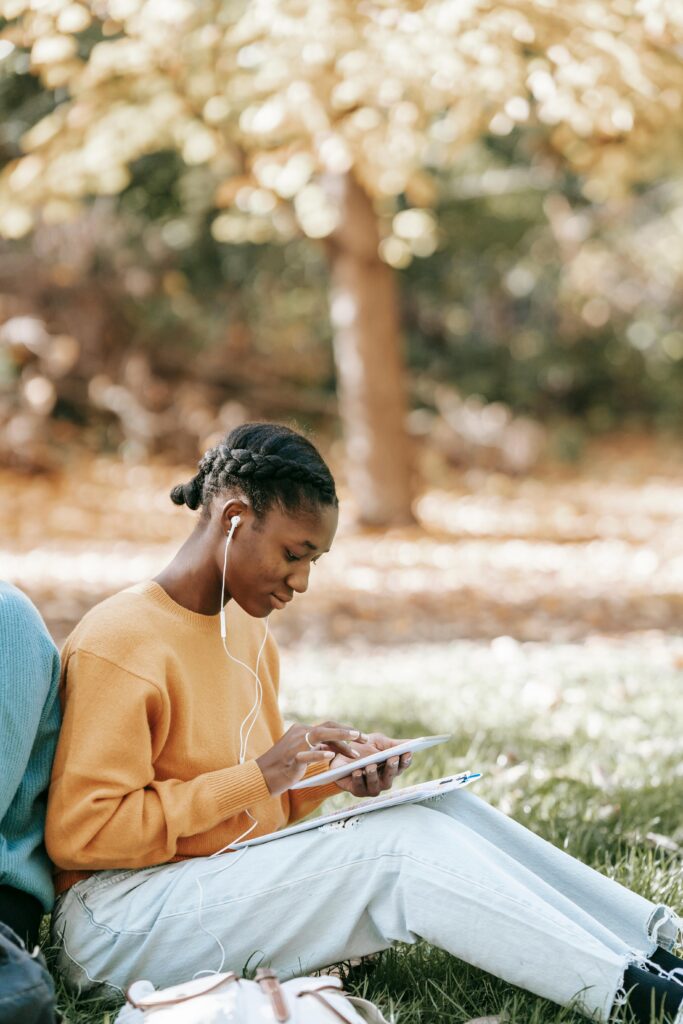
Technology
1. Describing using devices/ the internet/ apps/ Platforms: “Go on“
Meaning:
Go on can mean ‘use‘, ‘enter‘, ‘navigate‘ or ‘access‘ in the context of the internet, certain devices. It’s most natural with devices you interact with actively (like phones or laptops) and digital platforms or apps you “enter” or “navigate” (like social media or websites).
It sounds strange or incorrect with devices or systems that are more passive, single-purpose, or not “navigated” in the same way (like a TV or a microwave)
Examples:
1. Sometimes I go on X and check my newsfeed when I’m bored.
2. When I take long flights I go on my iPad and watch a movie.
3. I very often go on my phone and check the forecast.
4. I go on Instagram probably 3 or 4 times a day!
5. I go on Sky Sports Football to check the Premier League Results.
6. I don’t go on social media very much to be honest.
7. Getting around is so handy nowadays. We can just go on Google Maps and that’s it!
8. I get most of my clothes online. Sometimes I go on Uniqlo or Shein to browse some of the new clothes.

1. Devices
- YES (Natural with “Go On”):
- Phone: “I go on my phone to check messages.”
- Tablet (e.g., iPad): “I go on my tablet to read e-books.”
- Laptop: “I go on my laptop to do some work.”
- PC (Desktop Computer): “I go on my PC to play games.”
- Why it works: These are interactive, multi-purpose devices where you actively engage with content or apps.
- NO (Unnatural with “Go On”):
- TV: “I go on the TV to watch a show.” (Incorrect. Say: “I watch TV” or “I turn on the TV” or “I put on the TV”)
- Smartwatch: “I go on my smartwatch to see the time.” (Incorrect. Say: “I check my smartwatch.”)
- E-reader (e.g., Kindle): “I go on my Kindle to read.” (Awkward. Say: “I use my Kindle” or “I read on my Kindle.”)
- Gaming Console (e.g., PlayStation, Xbox): “I go on my PlayStation to play.” (Awkward. Say: “I play on my PlayStation.”)
- Why it’s weird: These devices are either passive (TV), single-purpose (smartwatch, e-reader), or framed differently in English (consoles).


2. Online Platforms
- YES (Natural with “Go On”):
- Social Media: Instagram, X, Facebook, LinkedIn, VK, WeChat
- “I go on Instagram to see photos.”
- “She goes on X every morning.”
- Search Engines: Google, Google Maps
- “I go on Google to look up recipes.”
- “He goes on Google Maps to plan trips.”
- Messaging Apps: Telegram, WhatsApp
- “I go on Telegram to chat with friends.”
- Why it works: These are digital “spaces” you enter or explore.
- Social Media: Instagram, X, Facebook, LinkedIn, VK, WeChat
- NO (Unnatural with “Go On”):
- Streaming Services: Netflix, YouTube, Spotify
- “I go on Netflix to watch movies.” (Awkward. Say: “I watch Netflix” or “I use Netflix.”)
- “I go on Spotify to listen to music.” (Awkward. Say: “I listen to Spotify.”)
- Email Clients: Gmail, Outlook
- “I go on Gmail to check my inbox.” (Unnatural. Say: “I check Gmail” or “I use Gmail.”)
- Why it’s weird: These are often treated as tools or services you “use” or “access,” not places you “go on.”
- Streaming Services: Netflix, YouTube, Spotify
3. Applications (Apps)
- YES (Natural with “Go On”):
- Shopping Apps: Taobao, Alipay
- “I go on Taobao to buy clothes.”
- Productivity Apps: Notion
- “I go on Notion to organise my tasks.”
- Finance/Trading Apps: Binance
- “He goes on Binance to trade crypto.”
- Why it works: These are interactive apps you navigate or spend time in.
- Shopping Apps: Taobao, Alipay
- NO (Unnatural with “Go On”):
- Single-Function Apps: Calculator, Alarm Clock
- “I go on my calculator to add numbers.” (Incorrect. Say: “I use my calculator.”)
- “I go on my alarm clock to set a timer.” (Incorrect. Say: “I set my alarm.”)
- Why it’s weird: These apps are tools with limited interaction, not “destinations.”
- Single-Function Apps: Calculator, Alarm Clock

2. Describing using applications/ websites: Log in/ Log out/ Sign in/ Sign out/ Register/ Sign up to
Meaning:
Log in/ sign in mean to enter a service or system. Log out/ sign out mean leave the application. Register/ Sign up to means enrolling in a service or program.
Examples:
1. I couldn’t log into the app, so I wasn’t able to buy a ticket!
2. I never sign out of some applications like Instagram or X.
3. I just signed up to this cool new shopping app.
4. She logs into her tablet every morning to check emails.
5. He forgot to log out of Google on my phone, so I saw all his searches!
6. I sign into my phone with my fingerprint—it’s so handy!
7. I had to register for a new account because I lost my old phone.

3. Describing saving data: Back up
Meaning:
Backing up your device means to save a copy of important files in case you lose them.

Examples:
1. I back up my laptop every month.
2. I never back up my computer.. I really should though!
4. Describing starting/ closing devices: Turn on/ Turn off/ Switch on/ Switch off/ Shut down
Meaning:
Shut down tends to only be for the computer. The others are common for phones, tablets and also laptops.
Examples:
- Sometimes when I’m with my friends, I just switch off my phone.
- My computer is getting really old. I always have to shut it down to get it working again.
- I always turn my phone off in work.
5. Describing choosing a channel/ station: Put on/ Stick on/ Throw on/ Chuck on
Meaning:
When talking about channels, whether on tv, record players, video or audio streaming sites, you can put a movie, show, song or record on. Stick on, chuck on and throw on are the same but more colloquial. You can keep the phrasal verb together or split it (put on a movie or put a movie on).

Examples:
1. After work I like to stick on an episode of The Simpsons.
2. I always put a movie on when I’m sad.
3. We threw on a little bit of Adele last night while eating dinner.
4. I always chuck on some reggae when cooking to put me in a good mood!
6. Describing Transferring data: Upload/ Download
Meaning:
Upload means sending data from your device to a server or the internet, while download means receiving data from a server or the internet to your device.
Examples:
1. I wasn’t able to upload my holiday pictures because our hotel’s wifi was down.
2. I tried to download the files but they failed.
3. I reckon we’ll be able to upload our consciousness to computers some day in the future!

7. Describing Browsing: To Browse (through)/ To Surf/ To Scroll (through)/ To Flick through
Meaning:
Browse and surf indicate general navigation, whereas scroll through and flick through are generally more for looking at sites on a smart device or navigating social media applications.

Examples:
1. Sometimes I browse through different products on the internet.
2. I love flicking through Instagram.
3. On Sundays, I flick through all the tv channels but there never seems to be anything good on!
4. I came across an interesting article while scrolling through my newsfeed.
Examiner: How often do you use a computer and for what purpose?
Student: I’d say I use a computer quite regularly, mostly for academic research and assignments. I also go on WeChat to stay connected with friends and family.
Examiner: Have you ever taken a course to improve your computer skills?
Student: Yes, I have indeed. I took an online course last summer to brush up on my programming skills which was super helpful.
Examiner: Which device do you prefer to use for browsing the internet?
Student: I prefer to go on my phone because it’s really handy. I usually flick through my favourite websites and social media apps.
Examiner: Do you enjoy using the internet?
Student: Yes and no! It’s obviously a great way to keep up with the latest news, trends, and connect with people from around the world but at the same time it can all feel a bit overwhelming.
Examiner: What kinds of apps or websites do you like browsing?
Student: I enjoy browsing educational websites and apps for my studies mostly. On top of that, I like to keep up with news and scroll through social media platforms to see what my friends are up to.
1. How often do you use a computer and for what purpose?
2. Have you ever taken a course to improve your computer skills?
3. Which device do you prefer to use for browsing the internet?
4. Do you enjoy using the internet?
5. What kinds of apps or websites do you like browsing?
i) Describe an item of technology you have that is very important.
You should say:
● what the technology is
● when you got it
● how often you use it
and say how different your daily life would be without it.
ii) Describe your favourite gadget.
You should say:
● What is it
● When did you get it
● How often do you use it
and say why is it so important to you
iii) Describe a device that you had a problem with.
You should say:
● What equipment it was
● What problem you had
● When you had this problem
and explain what you did about this problem.
1. Do you think most electronic devices are user-friendly?
2. Do you think parents should control what internet sites their teenagers use?
3. Could you suggest reasons why some people are deciding to reduce their use of technology?
4. How has technology changed since you were a child?
5. What technologies do you think will impact the world the most in the future?
Make up a story about a fictional character using each set of words. You must integrate all of these words in the correct tense into your story.
E.g. If the set includes the following: sign up to, put on, upload and flick through, the story could be something like this: “A high school student called Maria wasn’t having any luck with meeting guys at bars so she signed up to a dating app. She uploaded her best pictures and started swiping immediately. After flicking through 20 profiles, she found a match who asked her on a romantic date! She was over the moon and wanted to celebrate so she put some upbeat pop music on and danced like crazy!”
Set 1:
Go on
Upload
Flick through
Put on
Set 2:
Log in(to)
Back up
Stick on
Browse (through)
Set 3:
Switch on
Throw on
Scroll through
Download
Fill in the appropriate vocabulary in the correct tense from the following list to complete the story. The words may be used more than once or not used at all.
Go on, Log in/ Log out/ Sign in/ Sign out/ Register/ Sign up to, Back up, Turn on/ Turn off/ Switch on/ Switch off/ Shut down, Put on/ Stick on/ Throw on, Upload/ Download, To Browse (through)/ To Surf/ To Scroll (through)/ To Flick through
After uni, Jessica headed back home, cooked herself some ramen and 1) _______ some jazz. She first of all had to submit some work for class so she 2) _______ the student portal and attached her essay. Once it was 3) _______ , she 4) ______ of the portal and 5) ______ the computer completely and finished her ramen. She then got a message from her mate Steph to hang out later that day. She was struggling to think of things that they could do so she 6)_______ Instagram to see if there were any cool little cafes they could check out. She got sick of the jazz music that was playing, so she 7) _______ it ____ and 8) _____ an episode of Fresh Prince of Bel Air to put her in a good mood!
Answers
After uni, Jessica headed back home, cooked herself some ramen and 1) ___put on/ stuck on/ threw on____ some jazz. She first of all had to submit some work for class so she 2) ___logged into/signed into____ the student portal and attached her essay. Once it was 3) ____uploaded___ , she 4) ___logged out/signed out___ of the portal and 5) ___shut down/ turned off/ switched off___ the computer completely and finished her ramen. She then got a message from her mate Steph to hang out later that day. She was struggling to think of things that they could do so she 6)___went on/ browsed through/ scrolled through/ flicked through____ Instagram to see if there were any cool little cafes they could check out. She got sick of the jazz music that was playing, so she 7) ____turned/ switched___ it __off__ and 8) __put on/ threw on/ stuck on___ an episode of Fresh Prince of Bel Air to put her in a good mood!

